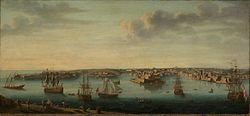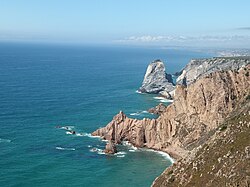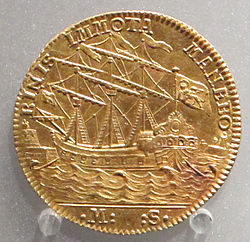Angelo Emo
[7] Angelo Emo's father, Giovanni di Gabriele,[8] had reached the position of Procurator of Saint Mark, the highest distinction for a Venetian citizen below that of Doge of Venice.
[13] As a result, at the age of twelve he was educated at the Jesuit college in Brescia, before returning to Venice in 1748,[1][8] where which his father chose as his tutors the scholars Giovanni Battista Bilesimo [it], Jacopo Stellini, and Carlo Lodoli.
[15] He was an ardent student of Venetian history, whose military achievements he sought to emulate in later life, as well as the ancient Roman historian Tacitus, who became his favourite author.
[5] The voyage proved adventurous: his ship, the large frigate San Vincenzo,[18] went up in flames and sank at the anchorage at Govino Bay in Corfu, on 11 May.
The wealthy patricians preferred reliable investments in their estates in the Terraferma to the hazards of the sea, the emergence of new commercial centres such as Livorno and Trieste siphoned traffic off from Venice, attacks by pirates were a constant threat, and the Genoese, Dutch and English merchants had come to dominate the westward routes into the Atlantic.
[23] The interruption caused by the War of the Austrian Succession had allowed the Venetian government, which remained neutral, the opportunity to try and seize back a share of trade with the Atlantic ports of Western Europe, equipping new and better ships and providing subsidies to merchants.
[31] During these years, Emo distinguished himself in escort duties of the trade convoys to Smyrna, repelling the attacks of pirates,[8][21] especially the Dulcignoti, from whose hands he recaptured a Venetian merchant vessel.
[35][36] As part of these attempts, in 1758 Emo was charged to lead an expedition to Lisbon, in order to await the arrival and cover the return of six Venetian merchantmen from London and protect them from anticipated Barbary pirate attacks.
Three days later, it reached Malta, where it gathered intelligence on the Barbary pirates, and in vain tried to find a competent pilot who knew the Atlantic waters up to Lisbon.
[41] A makeshift rudder was installed, which allowed the ship to once again reach the Cape da Roca, before yet another violent wind came from the south and drove the San Carlo to the north.
[47][48] Officially, the near-disaster was attributed to bad design on the San Carlo, which underwent refits and modifications as a result, but ended up sinking with all hands during another tempest in 1768.
[51] As the historian Federico Moro [it] states, for a career naval officer this posting amounted to a "humiliation", and is difficult to interpret as anything but an unofficial—given the prominence of his family, a more severe penalty was unlikely—reprimand for his actions in Portugal.
[52] Emo nevertheless executed his duties with zeal and severity,[51] and after the termination of its yearly tenure was elected as Savio ed Esecutore alle Acque (water commissioner) in 1761–62.
[55] Instead of directly proceeding to join the fleet at Corfu by sea, however, Emo travelled overland through Italy, visiting Florence, Rome, and Naples, where he was received by King Charles VII, before embarking at Otranto.
Accords were concluded with Algiers and Tunis in 1763, Tripoly in 1764, and Morocco in 1765, whereby the rulers of these states would prevent pirate attacks on Venetian shipping in the Adriatic and a zone of 30 nautical miles around the Ionian Islands, against a payment of a hefty annual tribute.
[58] The Barbary rulers did not always abide by the agreements; in 1766, Emo's cousin, Giacomo Nani, had to lead a naval demonstration off Tripoli to ensure the release of a captured Venetian vessel.
[59] In the next year, it was Emo's turn to conduct a similar operation against Algiers, whose bey tried to extort an increase in the annual sums agreed upon, and took Venetian ships and their crews captive.
[63] Emo's fleet suffered heavy losses when it was caught in a storm near Cape Matapan on 19 December 1771: half his squadron, the 74-gun Corriera and the 28-gun frigate Tolleranza, foundered off Elos, the former with almost all hands.
[68] Emo authored the commission's report, the Scrittura sul sistemare la marina da guerra in cui eravi il cav.
[69] In 1776–1778, again in the post of Savio alle Acque, Emo was responsible for several maintenance works around the Lagoon, on the Brenta River, the Terraglio road, and the canal of Cava.
[53] In 1779, as a Savio alla Mercanzia (trade commissioner), Emo promoted reforms such as the reduction of tax on silk, the opening of new shops at Šibenik (Sebenico) and the transfer of the Venetian consulate in Egypt from Cairo to the port city of Alexandria.
[8] In 1780 he was a Provveditore ai Beni Inculti (commissioner on uncultivated lands) and laid out plans for the draining of the Valli Veronesi, the Adige marshlands around Verona, a project begun already by Zaccaria Betti.
[70] When Venice resolved to send a permanent envoy to Saint Petersburg shortly after, Emo's name was on top of the list, but he managed to avoid the costly and unattractive appointment by pleading ill health.
[8] He also increased the salaries of non-noble officers,[8] introduced a theoretical training for naval cadets, as well as a publicly funded welfare scheme for invalid and aged sailors.
[6][79] The Tunisian fleet, geared towards piracy against merchantmen, did not sail to oppose the Venetians, who were able to infiltrate the harbour of La Goulette during the night of the 3rd/4th and retake a Neapolitan merchant ship just captured by the pirates.
[79][80] After replenishing water and supplies in Sardinia,[79] Emo sailed for Sousse, which he bombarded on 5–7 and 12 October,[79] before the autumn storms forced him to return to winter in Trapani in Sicily and Malta.
[82] After receiving reinforcements from Venice that raised his fleet to five first-rate ships of the line, one light frigate, two xebecs, one galiot, and the two bomb-vessels, Emo returned to La Goulette.
[91] In early 1787 the Senate recalled Emo with the bulk of his fleet, leaving only a small squadron under the Patron delle Navi Tommaso Condulmer to patrol the Tunisian coast.
The Senate feared that Emo's aggressive nature would hamper these efforts, and instead placed Condulmer, promoted to Capitano delle Navi, in charge of the naval blockade and peace negotiations.
[98] Dandolo insisted that this was the case, and identified his deputy Condulmer, ambitious not only to succeed him, but also to conclude a peace treaty with the Barbary states, as the culprit.








